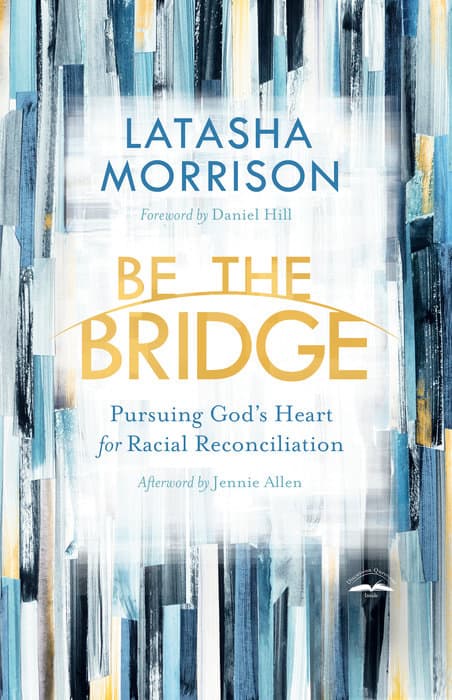
“The truth is that each ethnicity reflects a unique aspect of God’s image. No one tribe or group of people can adequately display the fullness of God.“
From Be The Bridge by Latasha Morrison
Latasha Morrison, in her book Be The Book, shares her journey with racism highlighting key steps she’s taken to find forgiveness and reconciliation. She reflects back on the trauma, discusses the present struggles and then tackles how we can work together going forward, in unity, all from Biblical perspective.
“In fact, Paul emphasized that unity can be found in diversity. We all have been given different gifts; we all are different parts of the same body. In the love of the family of God, we must become color brave, color caring, color honoring, and not color blind. We have to recognize the image of God in one another. We have to love despite, and even because of, our differences.”
From Be The Bridge by Latasha Morrison
The book is broken into three parts and ten chapters. Part one, The Bridge to Lament, tackles the history of racism particularly focusing on America. Through the stories of those who lived through the slave trade, Latasha corrects perspectives on what happened, invites the reader to empathize with the suffering and then calls on us all to lament. To mourn, as fellow humans, the pain we inflicted on one another, asking God for His forgiveness. The stories are heartbreaking and hard to read, that such atrocities were a part of life is chilling. Latasha doesn’t try and beat the reader with it but carefully illustrate a point. Using the Biblical stories to show how to lament on behalf of a community, of a people, she offers a way to grieve the past to bring healing whilst admitting the truth of what happened.
“Bridge builders don’t deny hurt. They experience it. Sit in it. Feel it. But they don’t stay in that pain. They don’t allow those who’ve wounded them to control them or constantly drive them back to anger and resentment. Instead, they allow that pain to continually push them into forgiveness.”
From Be The Bridge by Latasha Morrison
Part two, The Bridge to Confession and Forgiveness, discusses what roadblocks stop reconciliation, namely shame and guilt. The healing process is complex enough when it’s in the present day but working through pain inflicted over centuries, indoctrinated into culture and used by those involved to continue the division of people feels overwhelming and bewildering. By giving voice to the struggles of all the sides of the problem, Latasha shines light, hope and understanding. Drawing on her own experiences, the discussions held in her Be The Bridge sessions, and the Bible, she walks the reader through how to work through these emotions to allow healing to begin. She continues onto forgiveness, how to receive it and give it.
Part three, The Bridge to Restorative Restoration, encourages the reader to action, to repentance, making amends and reconciliation. The suggestions made are practical, small and not intimidating. Latasha shares the positive changes she’s seeing and instills hope in what can be acheived.
“But you can identify racial wrongs in the world around you and take one step toward making them right.”
From Be The Bridge by Latasha Morrison
It is not an easy read, but in picking up Be The Bridge, I didn’t expect it would be. Racism is so harmful, so dark, so divisive, my temptation is to hide from it and focus on the good in the world. Latasha’s book reminded me why that isn’t how we bring the light into the world, it isn’t how we make things better.
“If this book serves to highlight just one truth, I hope it’s that real beauty can come from the ashes of our country’s history with racism.”
From Be The Bridge by Latasha Morrison
Working through conflict, pursuing healing and truth, giving space to the stories of hurt and empathetically dealing with one another is part of the Christian life and Be The Bridge helped equip me to do this better, Jesus is referenced frequently to highlight how to live this out. I highly recommend it and it’s a five out of five on the en-JOY-ment scale.
From back cover:
A leading advocate for racial reconciliation offers a clarion call for Christians to move toward relationship and deeper understanding in the midst of a divisive culture.
With racial tensions as high within the church as outside the church, it is time for Christians to become the leaders in the conversation on racial reconciliation. This power-packed guide helps readers deepen their understanding of historical factors and present realities, equipping them to participate in the ongoing dialogue and to serve as catalysts for righteousness, justice, healing, transformation, and reconciliation.
I received a complimentary copy of the book from WaterBrook and Multnomah through NetGalley. Opinions expressed in this review are completely my own.

